Eclipse in Shymkent
1 August, 2008, 01:39 am in "Kazakhstan"
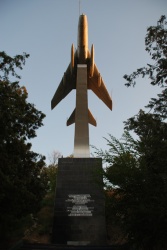 In Kazakhstan, one must get used to large spaces between one place and another. The bus ride from Turkistan to Shymkent was 3 hours. We passed a few small villages but mostly the landscape was flat plains--greener than the ones we went by yesterday, with corn and other crops occasionally breaking the stretches of wild grasses. As we drove out of Turkistan, we passed brick factories with piles of adobe bricks drying in the sun. Murat had pointed out the drying platforms the day before.
In Kazakhstan, one must get used to large spaces between one place and another. The bus ride from Turkistan to Shymkent was 3 hours. We passed a few small villages but mostly the landscape was flat plains--greener than the ones we went by yesterday, with corn and other crops occasionally breaking the stretches of wild grasses. As we drove out of Turkistan, we passed brick factories with piles of adobe bricks drying in the sun. Murat had pointed out the drying platforms the day before. There were herds of livestock: cattle and sheep, dotting the plains. We also saw a herd of camels. The bus did not have windows that opened. However, it did have vents that worked enough to blow some air at us. As usual, the person who threw up during the ride (a child sitting on his sleeping fathers lap) was sitting in one of the seats surrounding us. I wonder if we should start warning people.
Shymkent appeared to be lost in a cloud of dust as we drove in. Everything looked murky. I began to think the LP author who wrote it was a "vibrant" city had spent too much time in the desert.
We caught a bus to the center which traveled in a big zig zag making it seem like the city was huge. I kept asking if we had gotten to Ordabashi Square since LP said it was only 1.5 km from the bus station. A woman next to me reported it was "eshyo daleko" (still far). We began talking. She guessed I was a tourist right off. She was from Almaty but in town visiting her mother.
Eventually we reached our stop. (Later I realized that we were not at the main bus station mentioned in LP but at a different one, farther from the center).
Shymkent is actually a surprisingly attractive city. It doesn't have amazing landmarks but it has tall trees shading the sun drenched streets, and several shade filled parks-- a welcome relief after the dry landscape surrounding it. It feels like an oasis-- maybe it is. At a modern mall, we saw kids ice skating with really cool ice skating trainers.
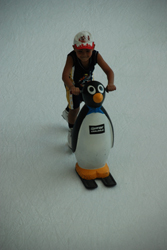
As we wandered around town blasted by the hot wind, R detected a slight cooling of temperature and the slightest change of light-- manifested by a faint unbleaching of the afternoon sky. "The eclipse!" he said. I looked at the shadows of the trees and saw the tell-tale marbled paper like patterns created by multitudes of tiny crescents of light-- the echo in miniature of the moon's shadow across the sun. To be sure, I punched a hole in my notebook cover which also revealed a little crescent of light being blocked by a shadow. We were too far South to see the full eclipse but it felt like we were in on a beautiful secret as we delighted in the patterned shadows and saw people giving us stranger than usual looks. At last we came upon a group of women and a girl viewing the eclipse through folded up pieces of film negatives. We had a look.
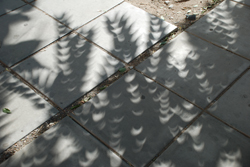
Our walk led us in a circle through town, stopping by a statue of Al-Farabi, and ending up back at the hotel.
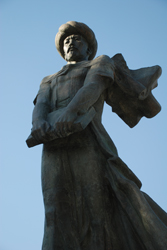
Across from the hotel is a pretty mosque whose roof shone in the sunset light.
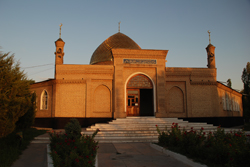
We walked up a hill and found a park with interesting statues, probably based on traditional designs.
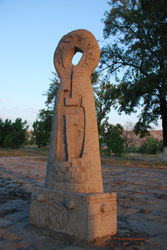
Kazakhstan needs a patient approach. Don't look for days packed with sightseeing but rather days gradually getting a sense of the place: the details of life that make it Kazakhstan, the warmth and friendly curiosity of the people, the blend of cultures that becomes visible in food, decoration, and architecture. Watch the open spaces. Rejoice in the occasional architectural wonder. Soak in the energy of the pilgrimage sights, the admiration, the voices of prayers. Enjoy the time you have and look at the details.
Visiting Arslanbob in Kazakhstan
31 July, 2008, 01:39 am in "Kazakhstan"
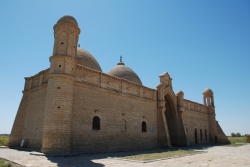 I woke up at 3:30 AM and decided we could turn off the AC. However, with the absence of the A/C's white noise, the pounding electronic techno music from a restaurant in town became to overwhelming so we turned the AC back on again. It wasn't actually that cool anyway.
I woke up at 3:30 AM and decided we could turn off the AC. However, with the absence of the A/C's white noise, the pounding electronic techno music from a restaurant in town became to overwhelming so we turned the AC back on again. It wasn't actually that cool anyway. In the morning, we walked into town by way of the Mausoleum. It's worth a 2nd and 3rd look anyway. The sun had already risen enough to bleach the colors from the surroundings with its harsh light.
We gave Murat a call and had him come pick us up and take us to the Arslanbob Mausoleum. The girl at the phone office showed us a photo when I asked her about it. The receptionist at the hotel had also recommended Arslanbob over Sauron.
Murat drove us out of town, pointing out the university and a few things here and there. Rowshan and him chatted in Azeri and Uzbek while I spoke to him in Russian. He was born in Turkistan. He said during the Soviet Union it was easy because he and other Uzbeks could go back and forth between Uzbekistan and Kazakhstan. Now, since they are separated countries, visas are required and bureaucracy makes it a lot harder. He mourned the fact that the Turks: Turkish, Azeri, Uzbeks, Kazakhs, and Kyrgyz, who are "brothers" are not able to freely move about the Turkish countries. I said they needed a kind of "Turkish Union" like the EU to make it so they could freely move about. Murat talked about Rowshan being his brother since he was Turkish. Many men call Rowshan "brother" when they find he is from Iran and a Moslem. I can't help noticing the happiness when they find this acceptable mark of "brotherhood." Murat also spoke about how there was discrimination against Uzbeks in Kazakhstan and how they were barred from getting good government jobs. Ethnicity is included in their passports.
We drove past flat, dry dusty lands. Murat pointed out some cotton fields and mentioned that Uzbekistan wanted the land to grow cotton because Kazakhstan wasn't using it and Uzbekistan had a much larger population but less land. I didn't ask where the water to grow the cotton would come from. I thought of the Aral Sea disaster which occurred due to attempts at irrigating cotton fields. I also didn't mention that I had heard Uzbekistan was also quite interested in the cultural monuments in the Turkistan area.
We did pass a couple small lakes but mostly the land was harsh and dry with scraggly dried bushes and grass. There were some horses and donkeys and at one point we passed a young man on a donkey herding camels.
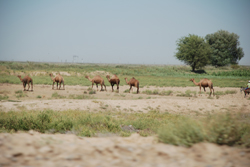
As we crossed the railroad tracks we saw a small tomb, which Rowshan had taken a photo of the day before from the train. It was called Shaxan Ata.
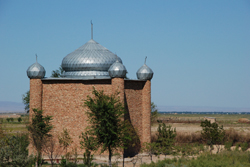
As we got closer to Arslanbob, the flat land became marked by some hills. Murat explained the hills contained ruins of old cities and archaeologists from Almaty were currently excavating them but were so far uncertain of how old they were. We passed one where the hill had a huge hole where excavations were taking place.
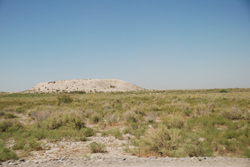
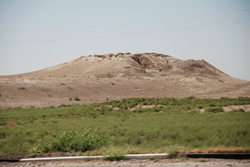
The area around the mausoleum had a surprising amount of activity for such an empty area. There was a cluster of buildings on one side of the street, a mosque, hotel, and some shops. In front of the gate to the area was a cluster of yurts: some souvenir stands, others cafes. The mausoleum was a striking brick building which rose majestically from the flat land. Though it wasn't huge, its design with graceful towers was striking.
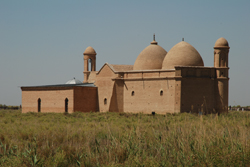
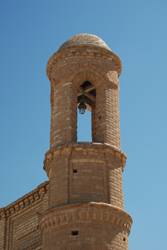
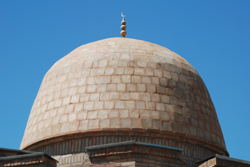
There are 3 Arslanbobs: one in Kazakhstan, one in Kyrgyzstan, and the third in Saudi Arabia (I think). All are supposed to be the burial place of Arslanbob.
Inside one side was a tiny museum with ceramics samples and some old books, documents, and maps with calligraphy on them. The mosque room had beautifully carved wooden pillars.
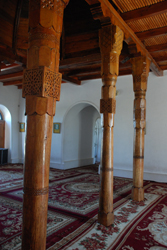
As we were looking around, an old man with about 10 children wandered in. They all quietly sat down. He spoke to them quietly and I thought perhaps he was a teacher with a group of students until some adults joined the group. Rowshan took a photo and spoke to one of the adults. They were all one family--grandfather, parents, aunts, uncles, cousins, children.
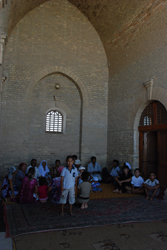
They moved to the outside covered area between the 2 rooms. I moved into the second room and saw several tombs, including that of Arslanbob--the teacher of Akhmed Yasaui. There was a man kneeling in the room with a scull cap and long olive coat. Not wanting to interrupt his prayers, I was about to leave but he gestured me in. I knelt next to him on the cushions along the edge of the room. He smiled showing gold teeth and asked in a gentle voice, where I was from. Then he asked if I'd like him to recite a prayer. I didn't answer, not wanting to offend but not sure of the protocol. He took this for an affirmative, asked me my name and then proceeded to sing a prayer--none of which I understood. He sang nicely and the tone of his voice was pleasant. An old woman and child entered. She knelt next to him and put a coin next to his knee. He sang a prayer for her. I put a coin next to his knee and thanked him. He sang another short prayer. I sat for a bit longer and noticed the swallows flitting around the room. Several had nests in the tips of the arches.
Rowshan and I walked over to the graveyard near the Mausoleum. Sometimes it seems like the graveyards in Kazakhstan have more interesting buildings than the towns: brick houses with domes and arches, silver moons or stars adorning the tops.
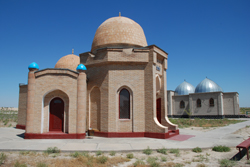
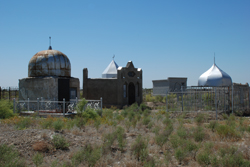
On our way back to Murat's car, a young woman yelled out "Hello! Welcome to Shymkent! How are you?" I replied, "Fine, How are you?" Just then, a car pulled up next to us and the passenger asked where we were from. I said America and they smiled and drove away.
Back in Turkistan, we had lunch at a cafe near the mausoleum. Their manti looked good but they'd just run out. So we got laghman which was also good with peppers, carrots, potatoes and sauce.
As we were walking back to the hotel via the mausoleum, someone called out, "Hello! Welcome to Turkistan!" It was the girl we'd seen in Arslanbob. She introduced herself, Alina, and her sister-in-law, Rosmila. She was with her family visiting the sights. She asked if we could take a photo together--without hats. We did. They were from Shymkent which she said was, "the hottest city". "Hotter than here!" I exclaimed. "Yes!" she replied. What have we gotten ourselves into? Murat had said the temperature today was 45 degrees outside when we got into the car at Arslanbob. I secretly thanked the Peace Corps for not sending me to Kazakhstan like I had requested. I told Alina, we were going to Shymkent tomorrow. She welcomed us to Turkistan, Kazakhstan, and Shymkent (in advance) and then left welcoming us to all of Kazakhstan. So far the people we have met from Shymkent have been so friendly, it makes me look forward to getting to the town in spite of the heat.
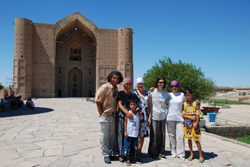
Desert Days in Turkistan
30 July, 2008, 06:08 am in "Kazakhstan"
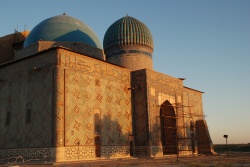 Although it was past 6PM, the hot wind blew through the town making it feel like we were walking through an oven. I expected my flesh to puff up and turn golden brown like a marshmallow over a campfire flame. I tried to shift my thoughts and convince myself it was comfortable-- like a fancy Scandinavian sauna except instead of the smell of cedar, the smell of toasted grass crunching as we walked across it towards the street. In the distance, the tall sun baked earth colored walls of the Akhmed Yasaui Mausoleum rose above the flat plain, its tiled domes startling turquoise against the sky. The flatness of the surroundings made the structure seem even taller.
Although it was past 6PM, the hot wind blew through the town making it feel like we were walking through an oven. I expected my flesh to puff up and turn golden brown like a marshmallow over a campfire flame. I tried to shift my thoughts and convince myself it was comfortable-- like a fancy Scandinavian sauna except instead of the smell of cedar, the smell of toasted grass crunching as we walked across it towards the street. In the distance, the tall sun baked earth colored walls of the Akhmed Yasaui Mausoleum rose above the flat plain, its tiled domes startling turquoise against the sky. The flatness of the surroundings made the structure seem even taller.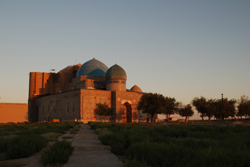
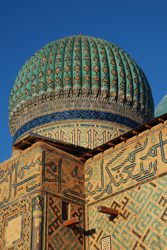
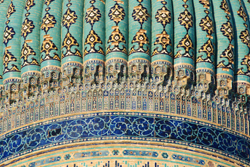
The outside of the mausoleum (on one side) was adorned with decorated tiles. Every detail was worth looking at: doors, windows and columns.
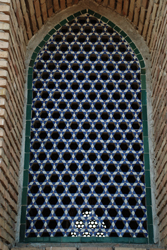
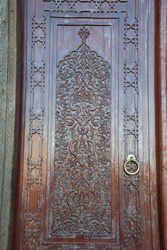
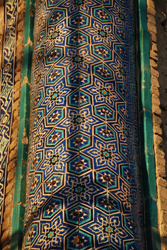
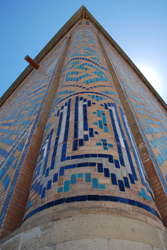
A little before dusk, we walked around the mausoleum. The sun, whose path across the sky was lengthened by the absence of hills, continued to scorch the air, but at the same time cast a golden light on the stones of the Rabisha Sultan Begum Mausoleum-- also adorned with turquoise, blue and white tile work in lace-like patterns or stylized calligraphy. Before it stretched a rose garden-- seemingly exposed but which was filled with red and pink flowers.
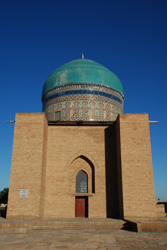
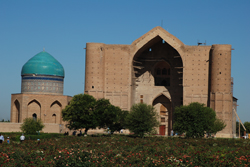
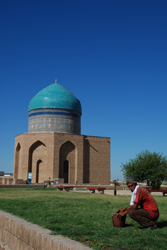
Next to the mausoleum was a huge wall, a reconstruction of the old city fortifications.
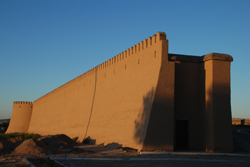
The inside of the Akhmed Yasaui mausoleum was white washed and spacious but the hot wind still blew through the inside. There was more tile work including an ornate Mithrab and huge decorated metal bowl/fountain, as well as the old, beautiful carved doors.
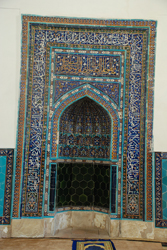
In the evening, Rowshan found that the birds all roosted on the rafters in the unfinished entrance of the mausoleum. For the first hour after dusk, the mausoleum resounded with their chirping as they settled for the night, vying for spaces on the crowded rafters.
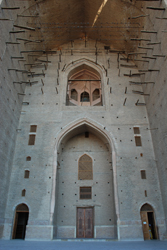
Birds Chirping
We've been in various stages of cooking for the last 24 hours. It started on the train ride from Almaty. Since we were late buying tickets, we were assigned beds in different cars. The train was full. We spoke with the people who were headed to the same place. The car I was in had no air conditioning but the windows opened. The one Rowshan was in had air conditioning but only the hall windows (as opposed to the ones inside the compartments) opened. As the train started, I saw my coupe mates were 2 little old ladies and one little old man, all wanting lower beds, but the compartment contained just 2. I walked through the 2 cars separating our cars from each other. Rowshan's AC car was sizzling. The AC only managed occasional weak gasps of cool air. There was a couple and 1 single woman. We were trying to convince her to trade but she wasn't sure-- worried about ending up in a coupe with a bunch of men. I assured her the occupants were all senior citizens and 2 were female. I offered to take and got ready for bed. her so she could at least have a look.
When we reached the car and she felt the cool air blowing through the open windows, she could barely conceal her joy and quickly agreed. I returned to Rowshan's car happy to be in the same coupe with him but knowing it wasn't going to be a comfortable night. Our coupe mates were a young couple from Shymkent. Married for about a year, Akmeryl was 7 months pregnant. Her husband, Kanat, was 22, a computer systems engineer, who spoke some English. We talked a bit.

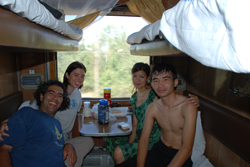
They had been in Almaty visiting Akmeryl's sister. They both were friendly and enjoyable travel companions. We ate a dinner of ramen noodles, and talked for a bit. Rowshan asked Kanat if he wanted a boy or a girl. He replied, "boy" and then said it was because they already knew they were going to have a boy. Then R asked if they had chosen a name. Kanat replied they hadn't because in their culture, the grandfather, if he was still living, chose the first child's name. Otherwise, the father chose it. Then, that child was considered to belong to the grandfather/father. The following child belonged to the parents. At one point R called me over to the window. The sky was filled with so many stars that familiar constellations were lost among all the glittering lights. The Milky Way drifted in a silky veil across the view. Kanat joined us at the window saying, "Lots of stars means it will be very hot tomorrow."
"I think Kazakhstan has more stars than the U.S." I replied.
It seemed like they cut the AC completely at night. We left the coupe door open so the air from the hall window could blow in but every now and then the train car attendant would shut the window and our door. I spent the night feeling like I was a turkey being basted in my own sweat. Finally, in the morning either the AC switched on for a bit or the air had cooled enough that we all managed to doze off until 10:30.
From that point on, the day just got hotter. The land outside was flat and the colors were shades of brown and gold. In the distance were low treeless mountains. Rowshan tried to learn some Kazakh words and found several similar to Farsi, others like Azeri. However, many were completely different.
At the stations, women would board selling pails of apples, clothing, and other wares. Others would walk next to the train with trays of chicken, fish, drinks and hard boiled eggs.
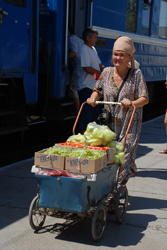
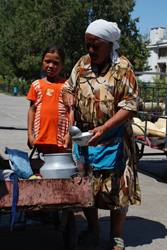
The towns were full of small houses with metal roofs which looked like they could double as gigantic solar powered grills. Rowshan felt sorry for the horses tied to their treeless fields. Our friends got off at Shymkent and we had the coupe all to ourselves. At one of the next stops, a man boarded and stood next to Rowshan at the window, trying to find refreshment in hot blasts of air whipping through it. He said it was 47 degrees C, thats 115 deg. F. That is way too hot. The man joked "Sahara" though when we were in the Sahara, it was actually cooler. I moved to the top bunk to try to be closer to the AC. The train car attendant came through and closed the window and coupe door so the AC might have a chance at cooling the tiny room at least. About 5 minutes later, she walked back, opened the window and coupe doors saying, "Vsyo" (That's all). The AC had officially died.
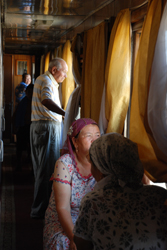
A man and a boy joined us in our compartment. They were also going to Turkistan, where they lived. They spoke Kazakh with each other but I could speak to them in Russian. The boy asked his father if he could climb onto the top bunk where he sprawled out happily and luxuriously. His father explained it was his first time on a train and never thought he'd find something like beds on one. He said he had 5 children, 2 boys and 3 girls. Before we left the train, the train car attendant apologized about the AC. Trying to be cheerful, I replied, "It is better than the bus!" She commended us on how we conducted ourselves with the other passengers and said many were curious about us but people who had spoken to us said nice things about us. Socially, we had enjoyed the train ride and the people we had talked with including the train car attendant.
We ended up taking a cab into town with the man and his son who had shared our coupe. He grabbed the first cab driver he saw and bargained the price down, we paid. He also walked with us into the hotel to help us get a room (even though we didn't really need help, it was still a nice gesture). The cab driver, Murat, asked where we were from. When Rowshan said he was Azeri, the driver replied he could understand Azeri. He was Uzbek. He and Rowshan chatted. Apparently, Uzbek is a lot closer to Azeri than Kakakh. He offered to drive us sightseeing if we wanted him to. He mentioned a place called Aristanbab where there was a famous tomb.
[ View 1 Comments
|
]
Powered by My Blog 1.69. Copyright 2003-2006 FuzzyMonkey.net.
Created by the scripting wizards at FuzzyMonkey.net..
(Code modified by Rowshan Dowlatabadi)
Created by the scripting wizards at FuzzyMonkey.net..
(Code modified by Rowshan Dowlatabadi)

